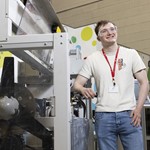

Adult 19+
Renewable and Subsea Engineering
Our courses are designed to help you develop the skills and knowledge needed for the industry. You might already be working in the engineering sector and want to diversify into this exciting landscape or you might be looking for a new challenge and a new career. Choose to study with us and you will be fully supported throughout your studies by industry experienced tutors who know what it takes to succeed.
You will benefit from our close links with industry and specialist facilities, which replicate real-working environments.
So whether you want to be a subsea engineer, wind turbine technician or project manager, our courses will get you skilled and ready for industry.
Next Event
Newcastle College University Centre Information and Clearing Events
Rye Hill Campus 14th-28th August 2025 Find out moreWhat can I study?
Advanced Manufacturing Engineering (Subsea & Renewables) - Level 3
Explore various engineering topics such as electrical and mechanical engineering, design principles and project skills in our dedicated Energy Academy.
Length: 1 year
Study: Full-Time
Start date: 1st September 2025
Location: Energy Academy, Wallsend
Skills Bootcamp Brightsparks (Welding) - Level 3
Launch your welding career with hands-on, industry-aligned training and gain cutting-edge skills in MIG and TIG Welding processes.
Length: 25 hours per week for 6 weeks
Study: Short Course
Start date: 3rd November 2025
Location: Energy Academy, Wallsend
Get In Touch
What can I do with a Renewable and Subsea qualification?
How can I progress?

University Centre
Choose from over 60 degrees developed in collaboration with employers, so you'll graduate with the skills you really need to secure your dream job.

Apprenticeships
Earn while you learn with an apprenticeship at Newcastle College.

Levels Explained
Trying to make sense of your grades? Not sure what you can study? Read our handy 'levels explained' guide.


 Application Tips for Adults 19+
Application Tips for Adults 19+
 A Parent's Survival Guide To Studying
A Parent's Survival Guide To Studying
 Adult 19+ Support
Adult 19+ Support
 Adult 19+ Financial Support
Adult 19+ Financial Support